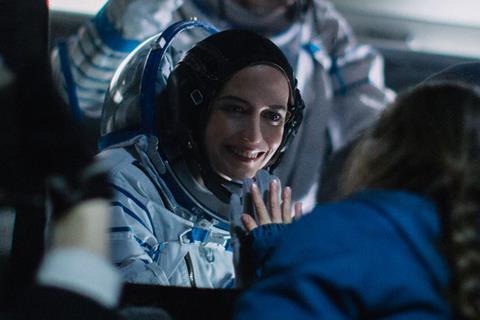Eva Green puts in a career best performance as the astronaut faced with a choice between her ambitions and her only child

Dir/scr: Alice Winocour. France/Germany. 2019. 107mins
In the current climate, would describing Alice Winocour’s third film Proxima as first and foremost a feminist masterpiece result in festival exposure and global sales deals and viewers, or alienate those who might otherwise have been attracted to this rock-solid story of a mother and astronaut-in-training played by a powerful Eva Green? Winocour is not one to make apologies in the way she writes and shoots, so let’s just split the odds by calling Proxima a significant, ambitious and entirely impressive film by a dazzling young French director in full command of her ship.
Winocour’s piece is low on melodrama and high on the type of authenticity, both physical and emotional, which wraps the audience tightly into the story
A landmark drama that would initially seem almost metaphorical in its depiction of the struggle of a brilliant mother who flies beyond the norm (an astronaut, no less), Proxima eventually proves itself to be very grounded indeed – such women exist, after all, and we find we can relate to them. The choices they make, such as leaving their children behind, are movingly described here, as is the hard-headed drive that gets these heroines into space in the first place. Premiering in Toronto’s Platform section before showings in San Sebastian and London, Proxima will test how comfortable general audiences are with Winocour moving the goalpoasts of cinematic convention when it comes to the depiction of a wife and mother. An almost unrecognisable, stripped-down, deeply physical turn from Green with solid support from Matt Dillon and Lars Eidinger should help. A flight-of-fantasy finale is more of an ease for the audience than integral to the primal story driving this film.
Green’s ambitious, talented, entirely-driven single mother Sarah wants a place on the European Space Agency’s Mars probe and will take it if offered, despite the fact it will require her to leave beloved daughter Stella (Zelie Boulant-Lemesle) behind. She is separated from Stella’s father (Eidinger), a broadly supportive career physicist who has no patience for the day-to-day juggling that managing a seven year-old child entails. Achieving that coveted place will require Sarah not only to move away from Stella; that’s her domestic, personal struggle. Professionally, getting into space will oblige her to prove herself time after time, to be better than her colleagues, always, in an all-male atmosphere which institutionally mistrusts her physical and emotional abilities. And if she does go, of course, she may die on the journey.
Wincour places great emphasis on the physicality of female astronauts – how do their bodies change, can you have a period in zero gravity? These space voyagers aren’t Hollywood superheroes, but ordinary humans putting themselves through extreme challenges. As Sarah, Eva Green has never been as good as she is here; Wincour drawing a performance from her lead actor that is as committed and sensitive as that of Mathia Schoenaerts’ in her last film, Disorder. Solid support from Matt Dillon, as the good ol’ boy captain who may turn out to be an unexpected ally, helps, as does Eidinger and in particular young Boulant-Lemesle who tries to help her cherished parent but only really knows what she herself needs.
A scene of mother and daughter clinging to each other in the pool at the European Space Agency facility is enormously affecting; even more so when Sarah is disciplined for staying that extra minute. And, as every mother knows, bringing a child to the office doesn’t always work out for the parent, the child, or anyone else in the room. That’s when Stella can be around; once Sarah moves to Moscow the crew must go into quarantine and physically detach.
Winocour’s piece is low on melodrama – until some final, unlikely scenes – and high on the type of authenticity, both physical and emotional, which wraps the audience tightly into the story. Sarah is real within Winocour’s highly-detailed, well-researched world (impressively shot on location in the ESA facilities in Cologne and in Star City near Moscow, the European setting bringing the prospect of national identity and collaboration to the table). Her choices are, by necessity, stark. By the end, which comes with an emotional and physical wrench and release, we understand and respect them.
But also, with Sarah’s strength also comes tenderness, emphasised by the limpid camerawork of George Lechaptois and the subtle musical score by maestro Ryuichi Sakamoto. Proxima may well bring tears to the eyes – of recognition, sympathy, frustration – of any mother who has ever struggled with guilt and love to moderate her own desires with the needs of a child, whether those dreams be small or out of this world.
Production companies: Dharamsala, Dairus Films, Pathe Films, Pandora Filmproduktion
International sales: Pathe International, sales@patheinternational.com
Producers: Isabelle Madelaine, Emilie Tisne
Production design: Florian Sanson
Editing: Julien Lacheray
Cinematography: George Lechaptois
Music: Ryuichi Sakamoto
Main cast: Eva Green, Matt Dillon, Lars Eidinger, Sandra Huller, Zelie Bouland-Lemesle
























